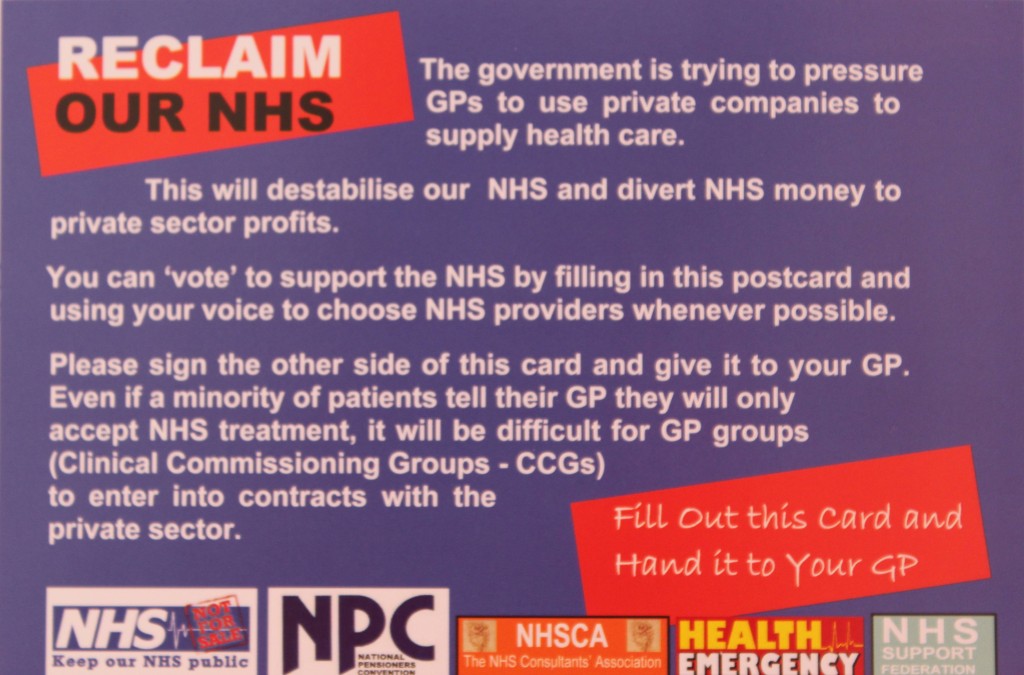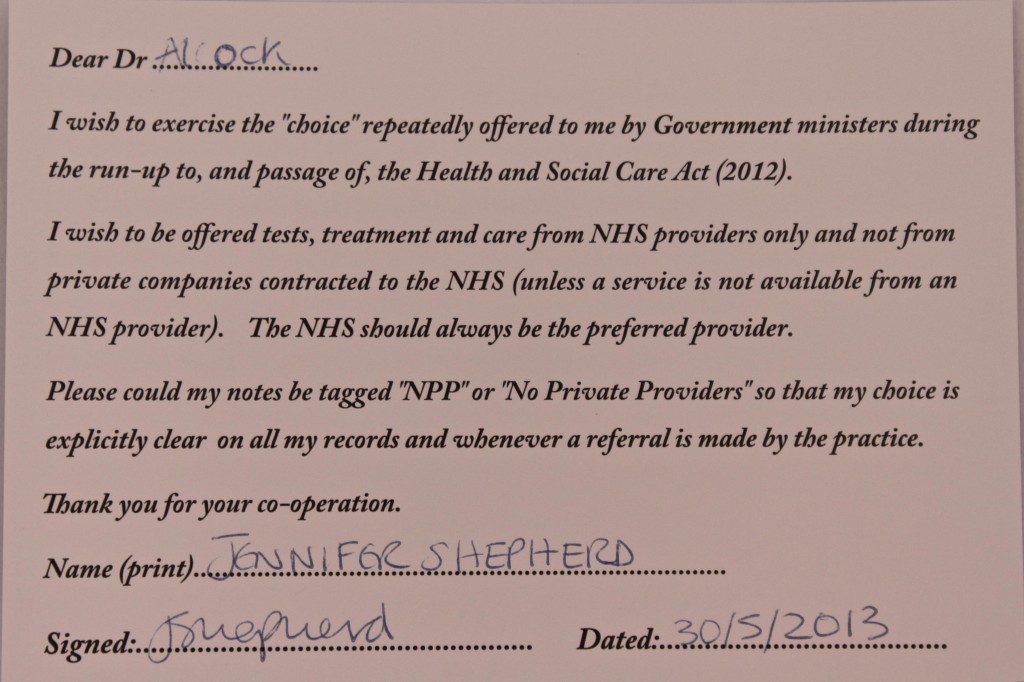How did Care UK and Virgin Care end up with contracts to run GP services in Calderdale? And after Calderdale CCG completes its review of GP services and community unplanned care (ie urgent care that isn’t A&E), how many more privatised GP services are we going to end up with?

Me, I’ve just given my GP a No Private Provider card to attach to my medical records, to make sure I only use NHS care. No privatisation for me, thank you very much. She studied it as if she’d never seen one before. But if it was the first she’d come across, I’m sure it won’t be the last. You might like to give one to your GP too – if so, please use the contact form, I have a couple of spares I can let you have, otherwise email calderdalesosc@gmail.com.
Why have we got these privately-run General Practices?
NHS Calderdale procured the five GP practices as part of their Practice Plus initiative to improve access to primary care, with funding from the Department of Health’s Equitable Access to Primary Medical Care Services scheme. This covered new, so-called “Darzi” GP practices – including the “walk-in services” that NHS Calderdale contracted from Care UK.
Lord Darzi was a surgery professor whom the Brown government asked to prepare a report about how to take key aspects of secondary care – eg diagnostics, day surgery and management of chronic illnesses – out of NHS hospitals. Darzi recommended new “GP-led health centres”, which would be run by “for-profit” providers. In their book The Plot Against the NHS, Colin Leys and Stewart Player write (p 45),
“What was really in prospect was corporate control of both primary care and a large part of existing NHS secondary care…”
In 2009 Calderdale Primary Care Trust awarded the “Practice Plus” contract to Care UK, following an open competition to submit bids. Under this contract, Care UK set up and ran the two new Tod and Halifax GP practices and Walk in Centres, with the contract set for 3,900 walk in contacts/year at each site. This contract also made Care UK responsible for awarding contracts to providers to run the other three new Practice Plus GP practices in Ovenden, Sowerby Bridge and Elland.
Accordingly, in 2009 Care UK/NHS Calderdale invited bids for contracts, to be awarded by Care UK, for these three GP services. The likely term of the contracts was advertised as 4 years, with the option to extend, and the likely total contract value was advertised as £4.8m.
The contracts for the Ovenden, Sowerby Bridge and Elland Practice Plus GP centres went to Assura Leeds LLP. Assura Leeds Limited Liability Partnership was a GP Provider Company (GPCo) consisting of around 26 General Practices in Leeds, working in a 50:50 joint partnership with Assura Medical. This company had started out as the Medical Property Investment Fund, acquiring and managing primary health care properties. In 2006 it entered into GPCos with GPs in order to take advantage of opportunities in changes to the primary care system. Before gaining the Calderdale contracts, Assura Leeds LLP provided dermatology services at four clinics in the Leeds area.
Assura Leeds LLP ceased to exist in 2012, when Virgin Care increased its stake in Assura Medical from 75% to 100% and announced that the GPs in Assura Leeds LLP would have to give up their 50% partnerships and become simply Virgin Care employees. As a result, Virgin Care took over the contracts that Care UK/Calderdale NHS had awarded to Assura Leeds LLP.
Virgin Care’s ability to take over NHS services without having to submit a bid for the contract is an obvious weakness in the Alternative Provider commissioning system. There seems to be no way to make sure that a contract to provide NHS health care stays with the provider that won the contract. This opens the door to all kinds of possible abuses.
Care UK GP contract riddled with problems
The Care UK contract for the Tod and Halifax GP and Walk In Centres was riddled with problems, relating to the fact that numbers of Walk In patients overshot the contracted number. This led Care UK and Calderdale NHS to mutually terminate the contract at the end of January 2012.
With this date looming, in July 2011 NHS Calderdale started inviting bids for the new contract for GP services at the Park and Calder Community Practices, with no provision for Walk In services. The contract was advertised for a likely term of 5 years, with an option to extend, and the likely value of the contract was between £4.5m-£5.6m.
The £4.92m contract was awarded in 2012. Neil Smurthwaite, the Assistant Director of Finance for NHS Calderdale, had undertaken the financial evaluation and found that both bidders were in a stable financial position and that the risks were minimal.
This was despite the fact that Care UK was bought by private equity company/vulture fund Bridgepoint Capital in May 2010, and promptly restructured, loaded up with debt and introduced to a tax avoidance scheme that saw it pouring money into the Channel Island stock exchange. By 2011 Care UK had slipped from profit to loss, largely due to the 9.75% interest payment it had to pay on the £250m bond Bridgepoint had to issue to pay for the acquisition.
Bridgepoint Capital split Care UK into two, creating a new company, Silver Sea Holdings, to build and own care homes, and rent them out to Care UK. This makes it easy for Bridgepoint to sell the care homes to property companies who want the buildings without the responsibility for running the care homes. It also puts Care UK in a vulnerable position.
This was exactly how Southern Cross care home company was split in two by its vulture fund owner, and this led to the financial collapse of Southern Cross. The UK government then had to guarantee that 300,000 Southern Cross care home residents would not be thrown out on the street when the company went bust.
Given publicly available information about the state of Care UK’s finances following its acquisition by Bridgepoint Capital, it seems surprising that Mr Smurthwaite decided that Care UK was in a stable financial position and posed minimal risks.
The NHS Support Federation observes that the NHS “market” is unstable, with commercial GP providers that are not making enough profit pulling out of contracts, just like Care UK has in Calderdale. It also notes that the doubtful profitability of primary health care (General Practice) leads commercial companies to cut the most expensive items – doctors – and replace them with cheaper employees like nurses.
New contract delayed, pending review of Calderdale NHS primary and community unplanned care
In January this year, before the new contract was implemented, Calderdale NHS proposed to close Care UK’s Park and Calder Community Practices. But due to public outcry, they have stayed open.
The new contract is now due to start in October 2013, without any Walk In services. The delay in starting this contract is to allow Calderdale CCG to review primary and community unplanned care.
To do this, Calderdale CCG has asked the West and South Yorkshire and Bassetlaw Commissioning Support Unit to support their review.This does not bode well.
The Commissioning Support Unit was set up with guidance from KMPG, a major accountancy and financial consultancy company strongly in favour of privatisation. The Commissioning Support Unit’s website quotes the Procurement, Patient Choice and Competition Regulations 2013:
“Local commissioners decide if and when to use competition as a tool to improve services for patients, within a regulatory framework, under which Monitor has a duty to protect and promote the interests of patients.”
But it rushes on to extol its abilities to help CCGs with the process of procuring health care from commercial health care companies, by “unravelling the mysteries of Any Qualified Provider”.
It’s not looking good.
I for one have just given my GP the “No Private Providers” card saying I will only accept NHS treatment, not stealth-privatised treatment. If enough of us do this, Calderdale CCG will find it hard to commission private health care companies to provide NHS care.
Updated 30 July 2013 with additional background about Darzi Centres and quote from Colin Leys & Stewart Player’s The Plot Against the NHS


Pingback: Streeting’s pro-privatisation NHS Performance adviser Lord Darzi has left a trail of wreckage behind him – NHS MATTERS!
Pingback: Bilfinger tries to resuscitate Todmorden Health Centre white elephant | Upper Calder Valley Plain Speaker
You seem to have missed the point that your GP does not work for the NHS any more or any less than Care UK or Virgin Care. GPs practices are for profit organisations who operate on NHS contracts, and have have been since the day the nHS was formed. You have given your “no private healthcare” note to a private healthcare provider!
As you say, since the NHS was set up in 1948, GPs have been independent self-employed contractors, not NHS employees. But there is a significant difference between traditional GP contracts and the “Alternative Provider Medical Services” (APMS) primary care contract, introduced by the New Labour Government in 2004, which opened the door to large private healthcare companies to take over NHS primary care services.
The APMS contract replaced the traditional contract with an individual GP or group of GP partners by one with a company employing GPs on a salary.
By the second wave of APMS primary care contracts, awarded in 2009, private companies won at least 40% of the contracts. These APMS contracts have a commercial focus and a corporate management structure. They are very different from traditional GP contracts.
GPs in the NHS may always have been self-employed contractors/ partners, but under traditional GP contracts their prime responsibility has never been to distribute profit to shareholders – or to allow private equity companies to asset strip them.